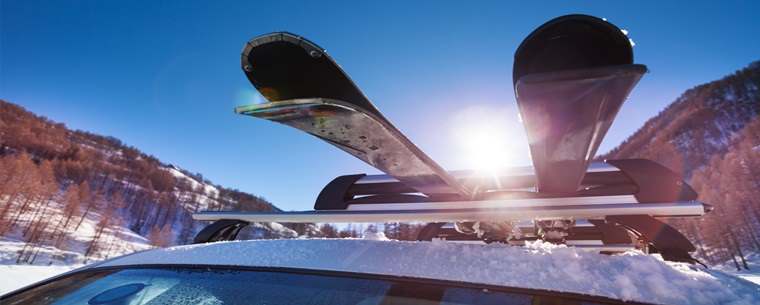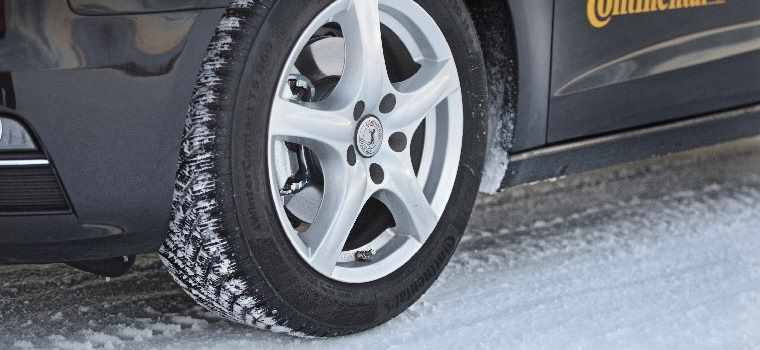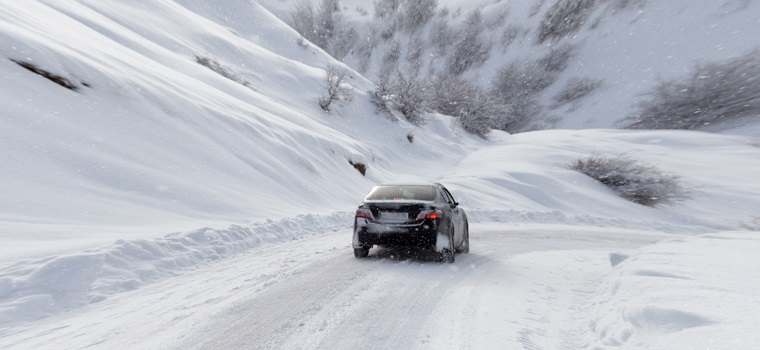The Essential Guide To Driving Through Europe in Winter
Kwik Fit | Monday 12th February 2018 1:08pm

Whether you’re looking to hit the slopes or see the sights, there are plenty of reasons to drive through Europe during the Winter. But do you know what equipment to bring? Or how to keep your car safe when the roads are icy?
Read on to find out everything you need to know if you’re planning to drive through Europe this winter.
Why drive through Europe during the winter?
The ski season in Europe runs roughly from November to April, so all the wintery months. While flying in sounds fun and relatively hassle-free, once you’ve added up the cost of the flights, accommodation, and equipment, it can be quite pricey, especially if you’re taking the family.
But there is one thing you can do to reduce the overall cost” drive to the Alps instead of flying. It’s arguably more relaxing (if you have plenty of in-car entertainment), and offers an amazing family adventure featuring beautiful countryside and scenery. On top of that, there’s also no lugging cases and equipment around airports, and no transfers to struggle with. You just jump into your car and drive all the way to your skiing destination.
You do, however, need to give careful consideration to your car and, in particular, your tyres when driving through Europe in the winter. Read more and discover what the rules are on the continent about winter tyres and chains.
Driving through France in the winter
From the United Kingdom, it’s very achievable to drive all the way to the French Alps in one day, albeit a long one.
If you’re travelling from the South East of England you can reasonably expect to be in the car for about ten hours. With this in mind, it’s no wonder most self-drive skiers opt for resorts in France like Méribel, Courchevel, and Chamonix that can be reached in time for dinner.

Of course, it takes a bit longer to get to the Italian Alps, but that’s certainly doable, and plenty of skiers regularly make this journey too, to enjoy the pleasure of the ski resorts at Cervinia, Sestrière and Courmayeur. You’ll have to drive through France most of the journey, before crossing over the border with Italy via the Mont Blanc tunnel.
What do you need to drive through Europe?
Wherever your final destination, if you’re driving in or through France there’s a standard, mandatory list of driver safety items that you absolutely must have in your vehicle. These include the following:
- A warning triangle
- High-visibility vests for your passengers
- 2 breathalysers
You will also need to make sure you attached headlamp converters to your headlights (so you don’t dazzle oncoming drivers).
These items are easy to pick up at the Euro Tunnel terminal in Folkestone but it is usually more cost-effective to buy these online before you set off. Make sure you have everything you need for driving in Europe before you set off.
Are winter tyres compulsory for driving in Europe?
In both France and Italy, winter tyres are “mandatory in certain areas”. Needless to say, though, driving through the mountains during winter is certainly one of the areas where winter tyres are required.
It’s important to make clear at this point that tyre chains are not a substitute for winter tyres. You will need to switch to winter tyres, or face the consequences of breaking the law. You can browse our full range of winter tyres here.
Leading premium tyre manufacturers, like Continental, offer an extensive, comprehensive range of superb winter tyres that are ideal for travelling in Europe and are designed and built for the most demanding cold weather and snowy conditions.

Contrary to popular belief, winter tyres are not just for driving in snow. The special rubber compounds they’re made from will improve grip on dry roads too if the temperature falls to 7°C or below. Improved grip in the cold means reduced stopping distances, significantly reducing your chances of having an accident.
So that means you’re not just buying a set of winter tyres for when you hit the snow during the last few miles up the mountain to your ski resort. In fact, they’ll keep you safer for the whole trip. They will also be useful when you get back to the UK’s typically-cold weather conditions while the temperature stays below 7 degrees.
Unlike summer tyres, winter tyres have far superior grip and handling abilities. Find out more about the differences between the two here.
When should you fit snow chains?
You’ll also need a set of snow chains when driving through parts of Europe in the winter — but UK drivers frequently get this bit wrong. Many will put the chains on their tyres at the foot of the mountain, in anticipation of snowy roads ahead. You should never do this.
Not only will you potentially damage your tyres, you’ll also be limited to very slow speeds causing traffic chaos and encouraging dangerous overtaking manoeuvres from others on the mountain roads. If this does happen, learn what to do during a breakdown in winter here.
If you’re driving in snowy, icy, cold weather conditions to your ski destination, only put chains on your tyres when there’s a significant amount of snow on the road and your winter tyres are not able to grip effectively. This is typically when the inclines get that little bit steeper.
What to know when driving to Austria & Switzerland
If you’re heading to a Swiss ski resort such as Zermatt or Verbier, your drive will more than likely take you through France before reaching your destination.
Switzerland has more or less the same winter tyre rules as France so make sure you read the section above for precautions to take when driving in France. .

If you’re travelling further to Austria for resorts like St Anton or Lech – you’ll probably be driving through Germany. In Germany and Austria, it is compulsory between November and April for all vehicles to be fitted with winter tyres, specifically, those with the “M+S” symbol on the tyre wall. You can find out what the writing on your tyres means here.
Unlike UK tyre law, It’s a legal requirement to have tyres with this symbol fitted. If you’re involved in an accident and your car is not fitted with them, irrespective of the facts you will be deemed responsible. What’s more, you’ll also incur an additional fine if it’s deemed that the accident you caused has resulted in delays for other drivers. Ouch!
It’s not just the Germans who take winter tyres seriously, In Austria there are very large fines - up to €5,000 - if you’re stopped by the police and they discover that you do not have winter tyres fitted. Best not to chance it.
Winter tyres for driving through Europe
Not surprisingly, most British drivers are just not used to switching to winter tyres in the cold season. Other than some remote parts, our climate means we don’t typically get much snow and because most people think winter tyres are only for driving in snow, we don’t feel the need to switch.
But don’t forget, winter tyres are all about driving in cold temperatures (7°C or below) something we do get a lot of in the UK during the winter months.
If you take regular ski holidays and you’re driving to Europe during the colder months, winter tyres are a very worthwhile investment – one that will not only protect you while you are on the continent, but also make your car safer when you’re driving back here in the UK during the winter months too.
To learn more about winter tyres, speak with your local Kwik Fit tyre professionals. We can offer you tyre safety advice, expert fitting solutions and much more. Find your nearest Kwik Fit centre here.
Any facts, figures and prices shown in our blog articles are correct at time of publication.
Featured Articles
Is it Illegal to Drive With One Headlight?
Saturday 19th July 2025
Wondering if it’s illegal to drive with one headlight? Learn about the safety risks and penalties of illegal blown bulbs and why you should fix them promptly.
Air Con in EVs & Hybrids: Experts Answer Your Questions
Monday 30th June 2025
Does air con drain EV batteries? Can you use the air con while charging an electric car? Find out the answers to these questions & more from Kwik Fit’s experts.
Why Is Your Car Making a Noise? Fixes & Tips
Friday 13th June 2025
When your car starts making unexpected noises, it can certainly be quite disconcerting; it may be nothing to worry about, but here’s what you need to know.









